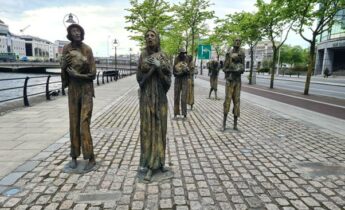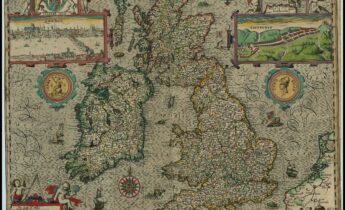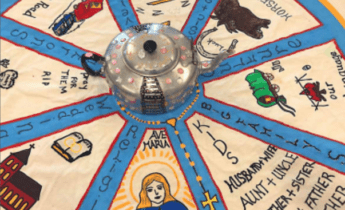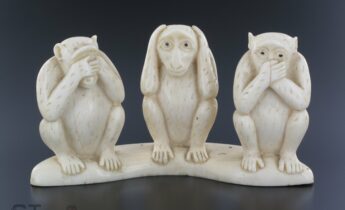Personal Details: Ní Cassaithe, Caitríona
Co-director (since August 2020) | Mitherausgeberin
Member PHW Executive Board
Is Ollamh Cúnta in Oideachas Staire í Caitríona Ní Cassaithe in Institiúid Oideachais, Ollscoil Chathair Bhaile Átha Cliath, Éire. Bhain sí a céim B. Oideachas agus a Dioplóma Iarchéime san Oideachas, amach i gColáiste Phádraig, Baile Átha Cliath. Chaith sí cúig bliana déag ag obair mar mhúinteoir bunscoile. Is ball den choiste a ghabhann leis an Ionad um Oideachas, Chearta an Duine agus Saoránacht (CHRCE) í Caitríona. Anuas air sin, ta sí ina comhstiúrthóir ar Thionscadal Náisiúnta Staire Béil COVID-19 - https://covid19oralhistory.ie/
Dhírigh taighde dhochtúireachta Chaitríona ar na tranglaim eipistéimeach atá ag leanaí faoin stair agus dhear sí cosain foghlama chun na iad a sharú. I measc na réimsí leathan a bhfuil suim acadúil aici iontu, tá: foghlaim agus múineadh staire ag leibhéal na bunscoile agus meánscoile, mar aon le hoideachas a ghabhann le músaem, oidhreacht agus áitbhunaithe, teicneolaíochtaí digiteacha i múineadh na staire (go háirithe Réaltacht Mhéadaithe agus Réaltacht Measctha), ag múineadh saincheisteanna conspóideacha agus litearthacht dhisciplíneach.
Caitríona Ní Cassaithe, PhD, is an Assistant Professor in History Education at the Institiute of Education, Dublin City University, Ireland. Caitríona completed her B.Ed. and PG Dip. Ed. in St. Patrick’s College, Dublin and spent fifteen years as a primary teacher. Caitriona is also a committee member of the Centre for Human Rights and Citizenship Education (CHRCE), DCU and is co-leading the Irish COVID-19 Oral History Project - https://covid19oralhistory.ie/
Caitríona’s doctoral research explored children’s epistemic “bottlenecks” about history and designed learning trajectories to challenge these. She has a wide range of research interests which include: the learning and teaching of history at primary and post-primary level, museum, heritage and place-based education, digital technologies in teaching history (particularly Virtual Reality and Augmented Reality), the teaching of controversial/contested issues in primary history and disciplinary literacy.
Caitríona Ní Cassaithe, Dr. phil., ist Assistenzprofessorin für historische Bildung am Institut für Bildungswissenschaften der Dublin-City-Universität. Caitríona hat ihr Studium am St. Patrick's College in Dublin abgeschlossen und dann 15 Jahre als Grundschullehrerin gearbeitet. Caitríona ist Mitglied des Zentrums für Menschenrechte und staatsbürgerliche Erziehung und ist Co-Leiterin des COVID-19-Oral-History-Projekts - https://covid19oralhistory.ie/.
Ihre Doktorarbeit erkundete die kognitiven "Engpässe" von Kindern bezüglich der Geschichte und entwickelte Lernarrangements um diese Engpässe zu überwinden. Sie verfolgt ein grosses Spektrum von Forschungsinteressen, zu denen das Geschichtslehren und -lernen an der Grundschule und darüber hinaus gehören, die Institution Museum, Erbe- und Lernortbasierte Bildung, digitale Technologien beim Geschichtslernen (insbesondere VR und Augmented Reality), das Unterrichten kontroverser/umkämpfter Themen und geschichtsbezogene Literacy.
-
“Shadows cast by our shared past” – the Irish Famine
“Shadows cast by our shared past” – the Irish Famine
The Irish Famine, a catastrophe which resulted in large scale loss of life and emigration, signalled a turning point in Anglo-Irish relations.
-
The British Isles: Simple Geography or Complex Histories?
The British Isles: Simple Geography or Complex Histories?
Monthly Editorial: June 2023 Abstract: Is it possible to separate geography from history and what role do place names play in positioning the things they name politically? These are two... Read More ›
-
Unsilencing the Histories of Ireland’s Indigenous Minority
Unsilencing the Histories of Ireland’s Indigenous Minority
We argue that the use of indigenous stories allows for the exploration of environmental issues in a holistic, informed and responsive way.
-
Sounding the Silences: History, Revision and Inclusion
Sounding the Silences: History, Revision and Inclusion
Histories, like narratives in general, can foreground or exclude. The choice of narrative subject is an inclusory and an exclusionary gesture.
-
History Education in a Climate of Crisis
History Education in a Climate of Crisis
Can history education, broadly understood, rise to the challenge of working within the ‘epochalyptic’ situation we are now in?